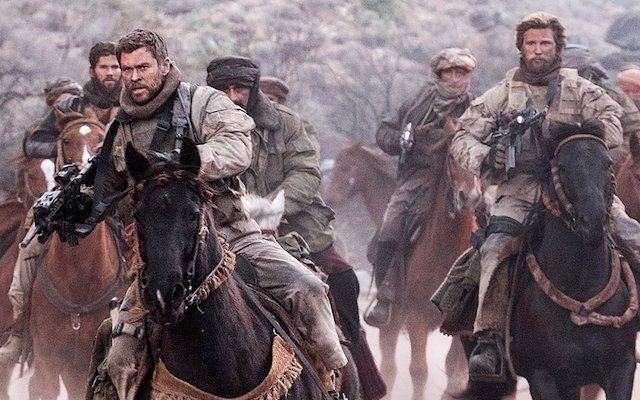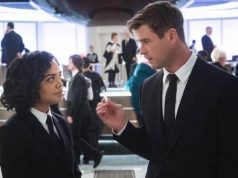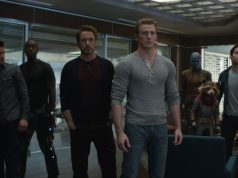
It’s going to take a few more years, but someday the movies about 9/11 and its aftermath will outnumber the movies about World War II (which at least had the decency to END, you know?). “12 Strong,” based on journalist Doug Stanton’s book “Horse Soldiers,” tells the story of the first American military action taken in response to the terrorist attacks, in which a Special Forces team joined with local forces to strike Taliban strongholds in Afghanistan. First-time director Nicolai Fuglsig pays appropriate tribute to the true acts of heroism that emerged from the mission, but as a movie, it’s just a formulaic war picture.
Chris Hemsworth stars as Capt. Mitch Nelson, who’s on leave when 9/11 happens but barges into HQ to say he wants to take his team into battle. He is told approximately one hundred times that he no longer HAS a team, but Capt. Mitch Nelson is the sort of brash, cocky soldier who doesn’t let facts get in the way. Col. Mulholland (an unsettlingly bald William Fichtner) does have a mission in mind, though, and he chooses Nelson to lead it because, while Nelson has no battle experience, he is the most awesome.
The mission is to meet up with prickly anti-Taliban warlord Gen. Dostum (Navid Negahban) and assist his forces in crippling the Taliban, which will weaken Osama bin Laden and al-Qaeda. Nelson chooses 11 men for his team, but the movie’s only interested in two of them: Hal Spencer (Michael Shannon), who tore up his retirement papers so he could join the fight; and Sam Diller (Michael Peña), a happy-go-lucky soldier who’s devoted to Nelson. The screenplay, by Ted Tally (who adapted “Silence of the Lambs” and “Red Dragon”) and Peter Craig (who adapted both parts of “The Hunger Games: Mockingjay”), falls into a rhythm of mini-missions, each with its own complications, each with clearly stated, oft-repeated objectives. Some films about war in the Middle East are complicated, ambiguous, or hard to follow. This, uh, is not one of those.
The firefights and other skirmishes are engaging, delivering what fans of war movies want to see and producing tension if you don’t know the particulars of the story. The rah-rah jingoism is kept to a minimum, and the opposite side of that — demonizing the enemy — is limited to one random scene of Taliban cruelty. There is a decided lack of emotion, though, with only a cursory attempt made to humanize the three leads or anyone else, their wives and children back home included only out of obligation. The events are depicted competently and soberly, but if they had any impact on subsequent events — if they have any significance at all in the context of the war — that impact and significance are not explored.
B- (2 hrs., 10 min.; )





